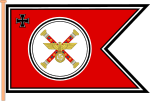Oberkommando der Wehrmacht
| Oberkommando der Wehrmacht | |
|---|---|

Command flag of the Chief of the OKW with the rank of Generalfeldmarschall (1941–1945)
|
|
| Active | 4 February 1938 – 8 May 1945 |
| Country |
|
| Branch | Wehrmacht |
| Role | German General Staff |
| Headquarters | Wünsdorf, near Zossen |
| Engagements | World War II in Europe |
| Commanders | |
| Chief of the OKW | Wilhelm Keitel |
The Oberkommando der Wehrmacht (OKW, "Supreme Command of the Armed Forces") was part of the command structure of the Wehrmacht (armed forces) of Nazi Germany during World War II. Created in 1938, the OKW had nominal oversight over the Heer (Army), the Kriegsmarine (Navy), and the Luftwaffe (Air Force).
Rivalry with the armed services branch commands, mainly with the Oberkommando des Heeres (OKH), prevented the OKW from becoming a unified German General Staff in an effective chain of command. However, it did coordinate operations between the three services. During the war, the OKW, subordinate to Adolf Hitler as Supreme Commander of the Wehrmacht, acquired more and more operational powers. By 1942, OKW had responsibility for all theaters except for the Eastern Front against the Soviet Union. Hitler manipulated the bipolar system to keep ultimate decisions in his own hands.
The OKW was established by decree of 4 February 1938 on the occasion of the Blomberg-Fritsch Affair, which had led to the dismissal of Reich War Minister and Commander-in-chief of the Wehrmacht, Generalfeldmarschall Werner von Blomberg. Hitler took the chance to get rid of his critics within the armed forces. The Reich War Ministry was dissolved and replaced with the OKW led by devoted General Wilhelm Keitel in the rank of a Reich Minister, with Alfred Jodl as Chief of the Operations Staff. Nevertheless, all Supreme Commanders of the armed service branches, like OKH Chief General Walther von Brauchitsch, had direct access to Hitler and were able to circumvent Keitel's command. The appointments made to the OKW and the motive behind the reorganization are commonly thought to be Hitler's desire to consolidate power and authority around his position as Führer and Reich Chancellor (Führer und Reichskanzler), to the detriment of the military leadership of the Wehrmacht.
...
Wikipedia
